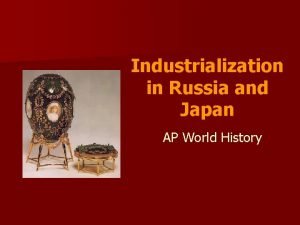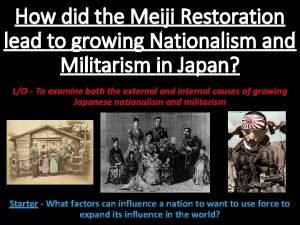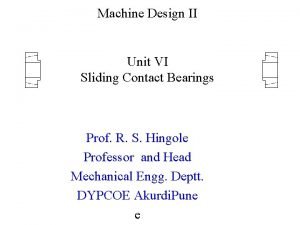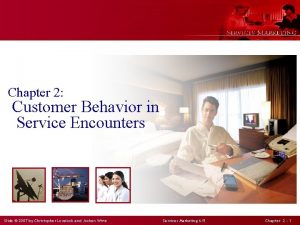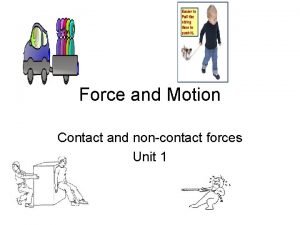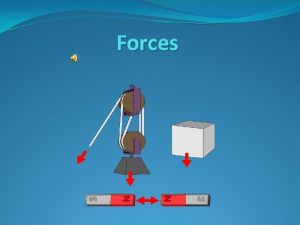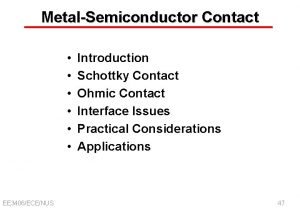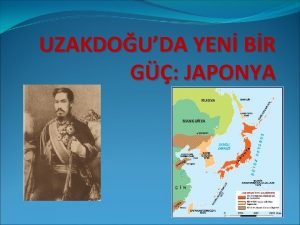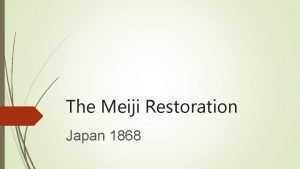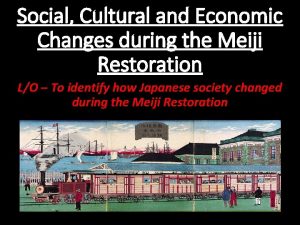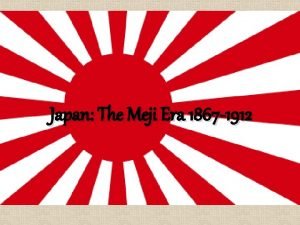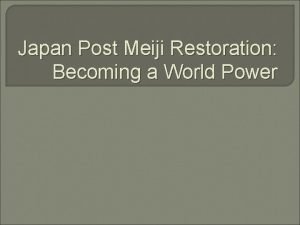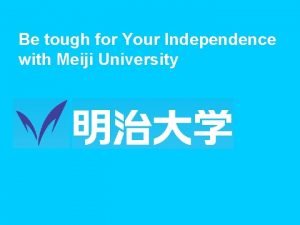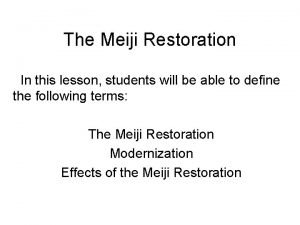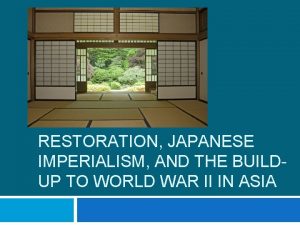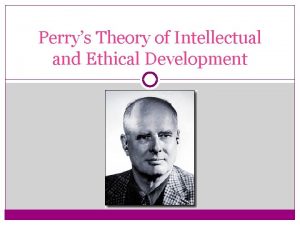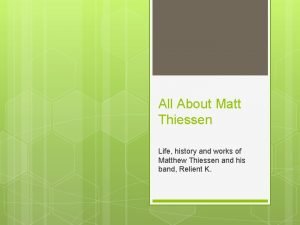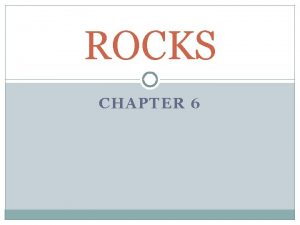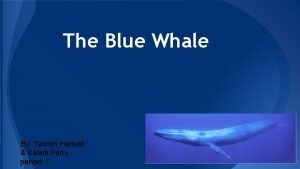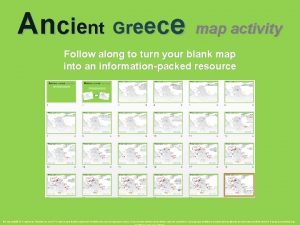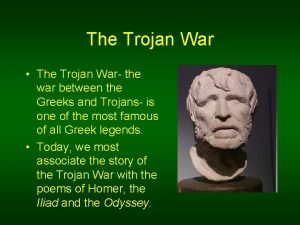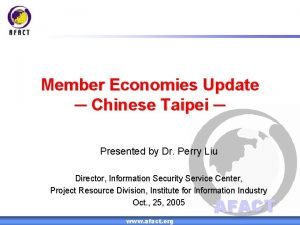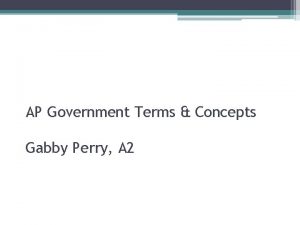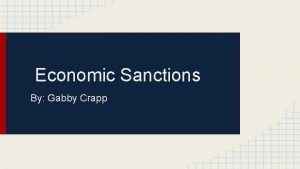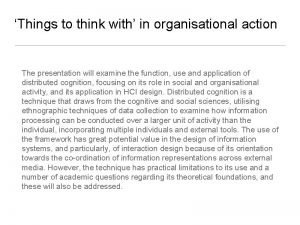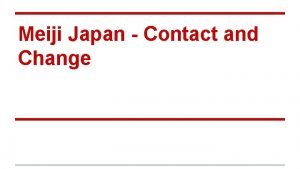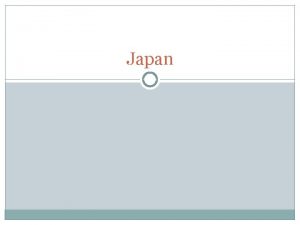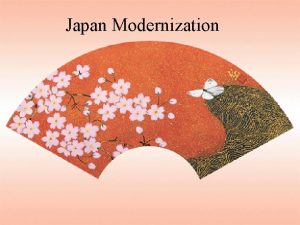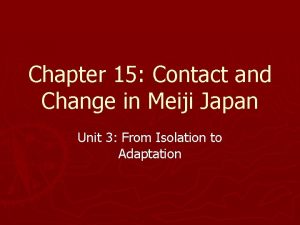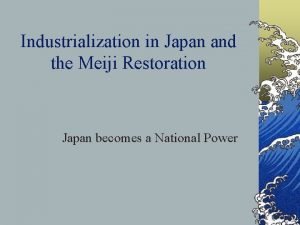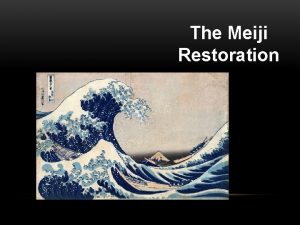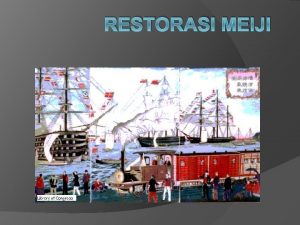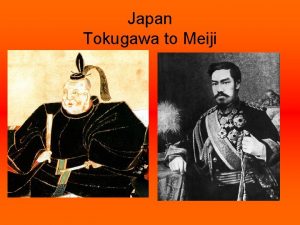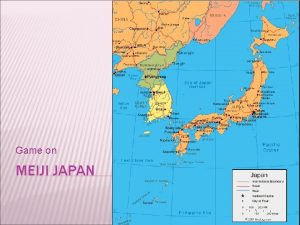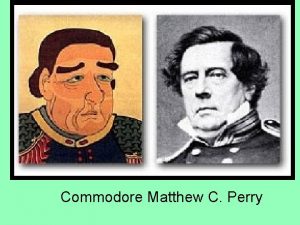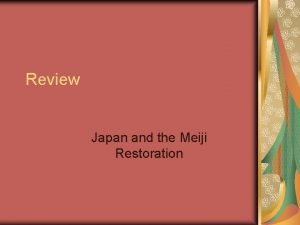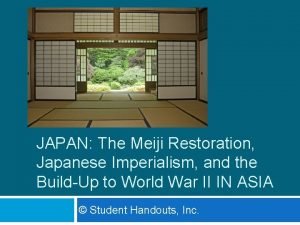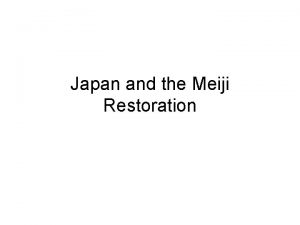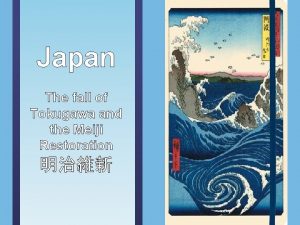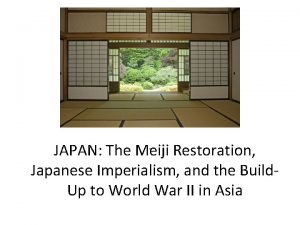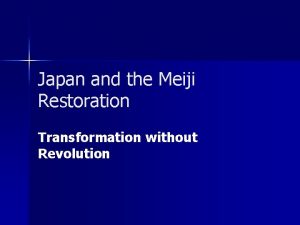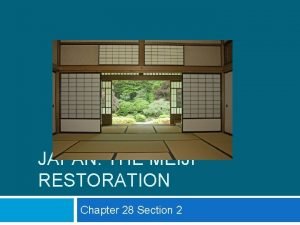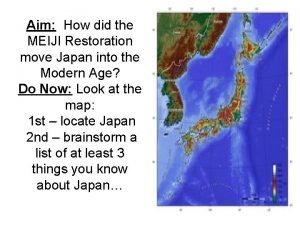Contact and Change in Meiji Japan Commodore Perry





































































- Slides: 69

Contact and Change in Meiji Japan


Commodore Perry § was the Commodore of the US navy who convinced Japan to “open up” to the West § 1853 - Commodore Matthew Perry’s ships arrived in Uraga Harbour. § It was the first Western military force to enter Japan § http: //www. youtube. co m/watch? v=ml. Cd. Gwy. T w. RM – 11: 00 min

Uraga Harbour

The End of Isolation § Imagine another country approached the Canadian government and demanded massive changes in the way Canada interacts with the world. § How do you think Canadians would feel? § Why might Canada give in to this pressure?

Previous Trade § Commodore Perry was not the first member of a foreign country who had tried to establish trade § What groups had previously tried to do this? § Portuguese, Dutch, Russians, British and Americans § How did the Japanese keep them out?

§ Perry’s visit was to be different § This time Japan would lose its battle to remain a closed society § When a country makes a decision like this it is usually because of pressures from outside as well as from within, what do you think some of those pressures may have been?

Pressure from Outside § The arrival of Commodore Perry caused a reaction similar to Cortes’s arrival in Mexico § Here were strange people behaving in a threatening manner § What would be the response to these dangerous people from the Japanese?

Perry’s Strategies § On July 14, 1853, Perry sailed into Uraga Harbour with 2 steamships, 2 sailing vessels, 977 men, and 66 guns which were larger than any the Japanese had ever seen § He presented a letter from president Millard Fillmore

The President’s Letter § Our great state of California produces about sixty millions of dollars in gold every year, besides silver, quicksilver, precious stones, and many other valuable articles. Japan is also a rich and fertile country, and produces many very valuable articles. Your imperial majesty’s subjects are skilled in many of the arts. I am desirous that our two countries should trade with each other,

§ for the benefit both of Japan and the United States…If your imperial majesty is not satisfied that it would be safe altogether to abrogate [ignore] the ancient laws which forbid foreign trade, they might be suspended for five or ten years, so as to try the experiment. § If it does not prove as beneficial as was hoped, the ancient laws can be restored. The United States often limit treaties with foreign States to a few years, and then they renew them or not, as they please.

§ As well as trade, it also looked for protection for shipwrecked American sailors and the right to buy coal for ships § Perry said that he would return for the Japanese answer to these demands

§ In 1854, Perry did return with eight black ships and more troops § This time, he and representatives of the shogunate signed the treaty of Kanagawa § 1) It opened two Japanese ports to American ships, 2) established an American consulate in Japan, and 3) accepted the demands regarding shipwrecked sailors and coal

Song of the Black Ships They came from a land of darkness, Giants with hooked noses like mountain imps; Giants with a rough hair, loose and red, They stole a promise from our sacred master. And danced with joy as they sailed away. To the distant land of darkness.

§ In 1858, a commercial treaty, giving further trading rights to the United States was signed § That same year, Japan signed similar treaties with England, France, the Netherlands, and Russia § Many Japanese were unhappy with the terms of these" unequal treaties”, which had been forced upon them § They had lost control over their trade

The Japanese Response to Perry § Japan held out against opening up trade for hundreds of years. § Why did the Japanese now respond to Perry’s visits as they did? § One answer is that Perry’s show of military strength worked; the Japanese recognized that the American’s had weapons that were far more advanced than their own § They did not want to bring about a war they might lose

§ Another answer is that the Japanese used their knowledge of what had happened between European powers and their Asian neighbours to help them make a decision § They decided that they wanted, above all, to avoid being “another China” § What do you suppose this means and why would they not want to be like China?

War Between China and Britain The Opium War (Anglo-Chinese War ) § In 1839, there had been a war between China and Britain § The Opium war had come as a result of trade between two powers § To balance its trade with China, Britain began to support the smuggling of opium from its Indian colonies to China

§ When the Chinese tried to ban the sale of opium, Britain sent warships and troops to attack Chinese ports § The British won the war and China ended up signing a series of “Unequal Treaties” with a number of European countries, which opened it up to trade

Pressures From Within § By the time that Perry and his ships arrived, there were already many tensions in Japan § There was a loss of respect for the shogunate and an uprising against the inefficiency and corruption of its officials § The pressures that the arrival of the Americans and the treaties that the Japanese had been forced to sign made the situation even worse § There were many ideas about what should be done

Ideas Motto Ideas Solution(s) “Honour the Emperor; expel the barbarians” Japan is the “divine 1) War against land”; the Japanese Westerners are superior to 2) Continued Westerners Isolation “Eastern ethics and Western science” Adopt Western technology, particularly military equipment, but keep Japanese values and morals Adopt some elements of Western civilization No motto Overseas trade is necessary to increase the wealth of Japan; change is inevitable Welcome the Americans and Europeans and trade with them

Culture Shock § Fact One – The Japanese had been isolated from most of the world for centuries § Fact Two – The treaties that were signed between the Americans and the Japanese brought these two peoples, who knew almost nothing about one another in close contact. § Expressionism ******

Assignment § What do you suppose it would be like to be from either culture? What would it be like to meet/ be around each other? § Express your opinion/ feelings/ beliefs of this situation in an expressionist manner





Disorder and Civil War § Many saw the treaties as proof that the shogun was weak § Groups that disagreed with the shogun or each other no longer debated their differences in council chambers, but instead took to rioting in the street and other acts of violence

§ Daimyo who opposed the shogun were retired or put under arrest § Their samurai were imprisoned, exiled or executed

§ Attacks on foreigners increased and at times, foreign gunboats bombarded the Japanese shore in response

§ Finally in 1868, the shogun resigned, but he formally petitioned the emperor to take over power § Civil war, (a war between organized groups within a single nation) broke out between those who wanted to restore the shogunate and those who favoured rule by the emperor § The country was divided

How would you decide who to fight for?

World Champions § § § 2002 Peter Lovering Canadian 2003 Rob Krueger Canadian 2004 Lee Rammage Canadian 2005 Andrew Bergel Canadian 2006 Bob Cooper British 2007 Jamie "Landshark" Langridge American § 2008 ? ? VIDEO

Substitution of weapons § In Indonesia, particularly Central Java, children play a variation that has the same rules but entirely different weapons and gestures. § As in the Japanese RPS game, they say jan-kenpon while pumping the fist before selecting a weapon. § An extended thumb is called "elephant". An extended forefinger is called "human being". An extended little finger is called "ant".

§ § § Elephant (thumb) crushes human Human (forefinger) crushes ant Ant (pinky) kills elephant by entering its trunk.

§ In the end, 30, 000 troops supporting the emperor blasted a shogunate stronghold for two weeks and then set it on fire § A new era in Japanese history was beginning

A Changing Order § When Prince Mutsuhito was made Emperor of Japan, he was not much older than 14 § What would it be like to be the head of a country that has just gone through violent and difficult times? § What steps would you take to turn yourself into a more capable/ knowledgeable leader?

What’s in a Name? § Mutsuhito selected a new name during the first year of his reign Meiji which means “enlightened rule”

§ The emperors had very much been in the background during the Tokugawa shogunate § They lived secluded lives in the imperial palace in Kyoto, hidden away from the people § In theory, the emperor was the supreme ruler of Japan, but in fact, the shogun had all the power

Meiji Restoration § The three year period, beginning in 1867 when the young emperor Meiji came to the throne is known as the “Meiji restoration” § Emphasized the importance of the emperor; he had been “restored” to his rightful place as head of Japan § Emperor Meiji’s reign lasted until his death in 1912 and it is known as the “Meiji Period”

§ The spread of education, the wealth of the merchant class, and the increase in commerce during the last century of the Edo era had set the scene for change in Japanese society

New Ideas about Government § The Samurai who had led the fight to defeat the shogunate and restore the emperor now became his advisors § This oligarchy, or unelected group of powerful leaders, took control of the government in the emperor’s name and ruled the country

§ The Meiji leaders began their program of reform by changing the way Japan governed. They had two goals: § 1) to create a strong central government that could unite the country and rule it effectively § 2) to create a form of government closer to the democracies of the West

Rallying Around the Emperor § The Emperor had always been a powerful symbol to the Japanese people § He was traditionally believed to be a descendant of the sun goddess Amaterasu § The Meiji leaders began their transformation by emphasizing that allegiance to the emperor § How would you do this?

Positioning § The first step was to move the imperial court from Kyoto to Tokyo, which was the new name for Edo, the capital § With the emperor and the government in the same location, the connection between the two would be obvious to the people

Losing Power § In order to increase the power of the emperor and the government, the Meiji leaders encouraged the daimyo to turn over their lands to the state § Although the daimyo were given pensions as compensation, the Meiji leaders pointed out that the land had actually always been the property of the emperor

The Five Charter Oath § The Imperial Council, the emperor’s advisors, spelled out the aims of the new Japanese society in the Five Charter Oath § 1) Deliberative assembly shall be widely established and all matters decided by public discussion § 2) All classes, high and low, shall unite in vigorously carrying out the administration of the affairs of the state

§ 3) The common people, no less than the civil and military officials, shall each be allowed to pursue his own calling so that there may be no discontent § 4) Evil customs of the past shall be broken off and everything based upon the just laws of nature § 5) Knowledge shall be sought throughout the world so as to strengthen the foundations of imperial rule

§ In addition, the samurai system was abolished by the government § At firs the samurai were given a tax-free income, but this did not last long § It was clear the samurai had to get jobs § The feudal system in Japan had now come to an end § In the future, only the government would have the right to collect taxes

The Real Last Samurai § http: //www. youtube. com/watch? v=r 5 Be. J 7 j 1 Fj 4 2: 29 min

Opportunities for the Common People § Commoners were given new rights after the Charter Oath § They were allowed to choose where they would live and what occupation they would pursue § They were now allowed to have a family surname § The old rules about dress were no longer enforced § Peasants were made the outright owners of their land § Legislation was passed to end discrimination of the outcasts

Education Reform § The Meiji leaders wanted to reform the Japanese education system to bring it closer to that of the West § For a time it was modelled on the American and French systems § In the early 1880’s the leaders decided that education needed to be based on traditional values and centered on developing respect for the emperor § Why would education be so important?

Family § In Japan, life stayed much the same for many, despite the Charter Oath § Traditional family patterns did not change § Fathers continued to have legal authority, making all family decisions about education, marriage, jobs and property § A family member who defied the father’s authority became a nonentity, (nonperson)

Class Distinctions § These remained § Common people still looked up to those who had been their superiors § The old upper class still held prejudices about the common people

Rural Peasant Life § Stayed largely the same § Land taxes were so high the much of the country ended up in the hands of money lenders or landowners § Peasant farmers ended up renting or “sharecropping” land owned by others and had to pay rent, even when crops failed

School § Many people could not afford to send their children, especially daughters, to school § In rural areas, many remained illiterate until the end of the Meiji period

Industrialization in Japan § Beginning in the mid 1700’s, there had been dramatic changes in the West in how goods were produces § Before this time, goods were generally made by hand in people’s homes and small workshops § Gradually, machines were invented that could do this work more quickly and efficiently

Industrial Revolution § Factories were built where many workers were employed to produce large amounts of goods, using increasingly complicated machinery § Transportation and communication were also revolutionized by machines § This period of time was called the Industrial Revolution

§ In Europe and North America, the Industrial Revolution had taken place over 100 years § In Japan, there was an intense industrialization over a much shorter period § How do you think the difference in pace may have affected Japanese lives and attitudes?

Borrowing Technology § Among the gifts that Perry brought to Japan were a miniature steam engine with its own track with batteries and 5 km of wire § These gifts impressed the Japanese § The Americans were impressed by the lacquer work, porcelain, and fine silk they received in return

§ 1762 – Steam Engines to drive factory machinery § 1787 – Power loom for weaving § 1793 – Cotton gin, a machine to clean raw cotton § 1807 – Steamboat § 1830 – First commercial railway service § 1834 – Mechanical reaper § 1837 – Electric Telegraph & SS Great Western, first ocean-going steamship § 1853 – Kerosene lamps

Tsuda Umeko § In order to modernize Japan, the Meiji leaders sent a mission around the world to visit and study dozens of countries in North America, Europe, North Africa and Southeast Asia § It was made up of ambassadors, historians and scholars § The government also sent along 60 students, some of whom were left behind to study in the countries they visited

§ Tsuda Umeko was a six or seven year old girl, (depending on which account you read), whose family volunteered her for this journey § It may have been that she was not valued as much by her family as a boy child would have been § She lived with a family in Washington, DC for 11 years § When she returned to her country she found herself a stranger and had to learn Japanese all over again

§ Tsuda was disturbed by the low position of women in Japanese society and their difficulty in obtaining higher education § She wanted to help women take their place in modern Japan § She returned to the US and enrolled in Bryn Mawr, a university for women

§ Although she was offered a fellowship and could have stayed, she retuned to Japan § She helped raise funds to enable other Japanese women to study abroad § In 1900, she founded one of the first private institutions of higher education for women in Japan

Tsuda Juku Daigaku (Tsuda College)

Borrowing Economic Ideas § The government began a wide scale project of gathering new ideas from abroad about technology § They hired experts and advisors from around the world to do jobs like installing factory machinery imported from the West § The outside experts had to leave once the Japanese workers were trained to replace them

§ Japanese representatives visited Europe and the US to learn about Western culture § They studied ship building, military science, factory construction and medicine § They made volumes of notes about banks, museums, parliaments, armies, churches and law courts § After their travels they returned home and reported to their government about how to set to work changing Japan

Cutting Edge Technology Today § Today, Japan is a world leader in electronics – and in designing and producing robots § According to Economist magazine, the Japanese love and trust their robots while the Westerners are mistrustful and frightened of them § Japan’s comics and films show robots co-existing with and helping humans § To deal with an aging population and a shortage of young workers, Japanese technicians are designing robots to do nursing work
 Commodore matthew perry apush
Commodore matthew perry apush Trans siberian railroad definition ap world history
Trans siberian railroad definition ap world history Japan before meiji restoration
Japan before meiji restoration Chamaedorea elegans - parlor palm, commodore palm
Chamaedorea elegans - parlor palm, commodore palm Commodore hotel astoria
Commodore hotel astoria Non contact force examples
Non contact force examples Which of the following is sliding contact bearing
Which of the following is sliding contact bearing Difference between high contact and low contact services
Difference between high contact and low contact services What are some contact forces and some noncontact forces?
What are some contact forces and some noncontact forces? Air resistance contact force
Air resistance contact force What is a contact force
What is a contact force Is tension a non contact force
Is tension a non contact force Atopic dermatitis vs contact dermatitis
Atopic dermatitis vs contact dermatitis Whats a noncontact force
Whats a noncontact force Dangling bond
Dangling bond Meiji restorasyonu yapılan yenilikler
Meiji restorasyonu yapılan yenilikler Meiji restoration
Meiji restoration Meiji restoration samurai
Meiji restoration samurai Shogunate
Shogunate Meiji restoration
Meiji restoration Jelaskan latar belakang munculnya restorasi meiji
Jelaskan latar belakang munculnya restorasi meiji Meiji university ikuta campus
Meiji university ikuta campus Meiji restoration definition
Meiji restoration definition Define meiji restoration
Define meiji restoration Kao kurenjo
Kao kurenjo Dualism multiplicity and relativism
Dualism multiplicity and relativism Matt thiessen and katy perry
Matt thiessen and katy perry Examples of physical changes
Examples of physical changes Absolute change and relative change formula
Absolute change and relative change formula Difference between chemical and physical changes
Difference between chemical and physical changes Change in supply and change in quantity supplied
Change in supply and change in quantity supplied What is an example of chemical and physical change
What is an example of chemical and physical change Rocks change due to temperature and pressure change
Rocks change due to temperature and pressure change Whats the difference between physical and chemical changes
Whats the difference between physical and chemical changes First-order change
First-order change Blue whale facts
Blue whale facts Perry glasser
Perry glasser Roar poem
Roar poem Richard perry neurologist
Richard perry neurologist Like thunder gonna shake the ground
Like thunder gonna shake the ground Perry reece map
Perry reece map William g perry jr
William g perry jr Trojan labor
Trojan labor Perry como sunrise sunset
Perry como sunrise sunset Katy perry poem
Katy perry poem Lee burdette williams medium
Lee burdette williams medium Dr. perry sugar
Dr. perry sugar Perry grigsby
Perry grigsby Katy perry firework figurative language
Katy perry firework figurative language Video game lawyer
Video game lawyer Importance of the study example
Importance of the study example Perry high school marching band
Perry high school marching band Dog vaccination perry county
Dog vaccination perry county Perry babb
Perry babb Clarence perry
Clarence perry Dr perry liu
Dr perry liu Dr richard perry neurologist
Dr richard perry neurologist Bill perry designs
Bill perry designs Josephine david perry
Josephine david perry Gabby perry
Gabby perry Kuhn perry
Kuhn perry Mark perry
Mark perry Perry zinn rowthorn
Perry zinn rowthorn Jason perry md
Jason perry md What are sanctions
What are sanctions Edie mccredie bus
Edie mccredie bus Perry high school marching band
Perry high school marching band Perry aritua
Perry aritua Mark perry brunel
Mark perry brunel Ut tyler scholarship
Ut tyler scholarship

